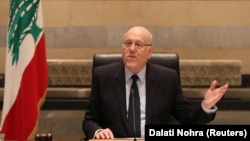The Lebanese Army said Wednesday it was sending more troops to southern Lebanon to help oversee the first hours of the new cease-fire between Hezbollah militants and the Israeli military.
The truce, after nearly 14 months of fighting, appeared mostly to be holding. But the Israeli military said it shelled two villages in southern Lebanon, Khiam and Kfar Kila, with its soldiers opening fire after identifying a vehicle in “a zone prohibited for movement” in Lebanon and forcing it to turn around.
Thousands of people displaced by the Israeli-Hezbollah conflict streamed south out of Beirut on jam-packed roads, returning to their homes in towns and villages, many of which have been destroyed or heavily damaged by Israeli strikes.
The masses strapped suitcases, mattresses, blankets and other belongings to the rooftops of their cars, inching along roadways and hoping for a return to their former lives. But the Israeli military warned civilians against returning to some areas where its forces are still positioned.
U.S. President Joe Biden said in a social media post that the United States, which helped broker the Hezbollah-Israel cease-fire, would in the coming days “make another push” for an Israeli-Hamas cease-fire in Gaza. Biden said the truce in Lebanon “brings us closer to realizing a future I’ve been pushing for my entire presidency where the Middle East is at peace, prosperous, and integrated across borders.”
Lebanese caretaker Prime Minister Najib Mikati said in a televised address: “It is a new day, on which the page is turned on one of the harshest periods of suffering that the Lebanese have lived through in their modern history.”
Mikati called on Israel to respect the terms of the agreement, but did not mention Hezbollah, which is designated as a terror group by the U.S. and other Western governments. It is not under the Lebanese government’s control, but under the terms of the cease-fire, the militant group is supposed to retreat from southern Lebanon to north of the Litani River.
Israel killed several of Hezbollah’s longtime leaders during the months of fighting and continued to shell what it said were Hezbollah strongholds until the last hour before the truce took effect.
The United States, along with France, played a key role in brokering the cease-fire, which Israel’s Security Cabinet approved late Tuesday.
Biden called the cease-fire “a critical step … to end the violence” in the Mideast. He said that Iran and its proxies, Hezbollah in Lebanon and Hamas militants in Gaza, “have paid a heavy price” in more than a year of fighting Israeli forces.
He said the Israeli-Hezbollah agreement “is designed to be a permanent cessation of hostilities.”
But Biden, speaking at the White House, warned, “Let me be clear, if Hezbollah or anyone else breaks the deal and poses a direct threat to Israel, then Israel retains the right to self-defense consistent with international law, just like any country, in facing a terrorist group pledged to that country’s destruction.”
Biden said that with Hezbollah agreeing to end its attacks on Israel, “Hamas has a choice to make. Their only way out is to release the hostages [it is holding in Gaza], including American citizens.”
Israeli Prime Minister Benjamin Netanyahu said he favored a truce with Hezbollah so Israel could focus its attention on the broader threat posed by Iran, refresh its forces and isolate Hamas in its ongoing fight against Israel in Gaza.
Netanyahu vowed that if Hezbollah renews its attacks on Israel or rearms itself, Israel will immediately resume its bombardment of militant sites in Lebanon.
“The length of the cease-fire will depend on what happens in Lebanon,” Netanyahu said. “With the full understanding of the United States, we are preserving full military freedom of action — if Hezbollah breaks the agreement and seeks to arm itself, we will attack.”
VOA State Department bureau chief Nike Ching, United Nations correspondent Margaret Besheer and White House bureau chief Patsy Widakuswara contributed to this report. Some material in this report came from The Associated Press, Agence France-Presse and Reuters.



